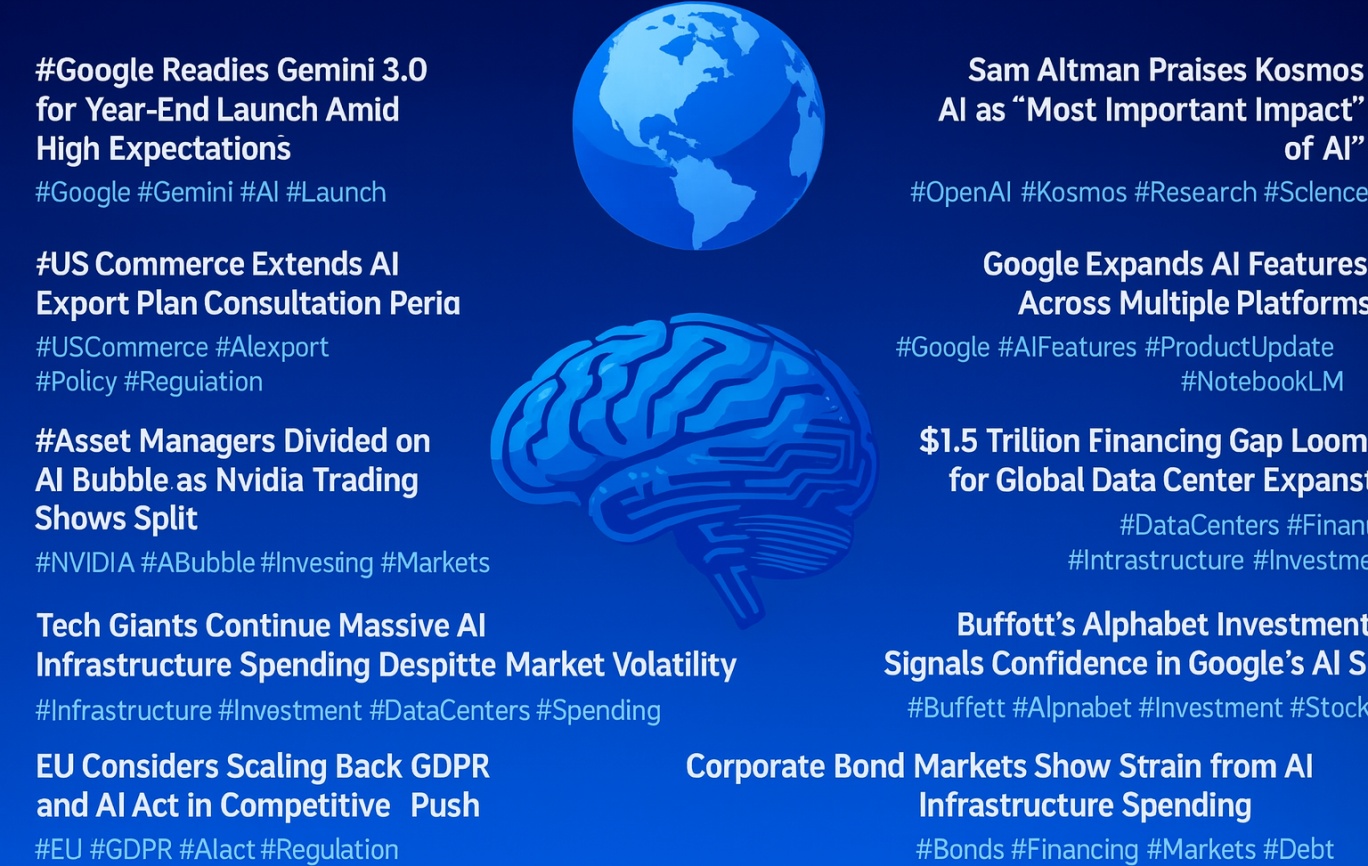AI News on November 18th

1. Google Readies Gemini 3.0 for Year-End Launch Amid High Expectations
#Google #Gemini #AI #Launch
Google is preparing to launch its Gemini 3.0 AI model by year-end, with internal tests showing impressive capabilities in 3D environment building, interactive website design, and dynamic content generation. The model represents Google's significant push to compete with OpenAI's ChatGPT.
2. US Commerce Department Extends AI Export Plan Consultation Period
#USCommerce #AIExport #Policy #Regulation
The US Commerce Department will extend the public consultation period for the AI export plan proposed by President Trump, moving the deadline from November 28 to December 13. The extension responds to requests from major tech and trade groups who cited the complexity of the issues involving national security and international market participation.
3. Asset Managers Divided on AI Bubble as Nvidia Trading Shows Split
#NVIDIA #AIBubble #Investing #Markets
Major asset managers are showing significant divergence in their positions on Nvidia, reflecting heated debates about whether AI stocks are in a bubble. While some institutions warn of excessive valuations, others point to strong corporate earnings and robust capital expenditure plans as evidence of genuine growth potential.
4. Tech Giants Continue Massive AI Infrastructure Spending Despite Market Volatility
#Infrastructure #Investment #DataCenters #Spending
Leading technology companies are maintaining aggressive AI investment strategies, with Meta, Google, Amazon and Microsoft projected to collectively spend over $400 billion on AI infrastructure next year. Anthropic alone plans to invest $50 billion in US AI infrastructure, while Google continues with $40 billion Texas data centers and $5.5 billion German expansion.
5. EU Considers Scaling Back GDPR and AI Act in Competitive Push
#EU #GDPR #AIAct #Regulation
The European Union is preparing to announce a rollback of parts of its landmark AI Act and data privacy rules, aiming to boost competitiveness against US and Chinese tech rivals. The proposed Digital Omnibus package could include a one-year grace period for high-risk AI systems and narrower definitions of personal data.
6. Sam Altman Praises Kosmos AI as "Most Important Impact of AI"
#OpenAI #Kosmos #Research #Science
OpenAI's Sam Altman endorsed Kosmos, a new AI research tool from Future House, calling it "one of the most important impacts of AI." The AI scientist tool can reproduce unpublished scientific work in a single run that takes human researchers approximately four months to complete.
7. Google Expands AI Features Across Multiple Platforms
#Google #AIFeatures #ProductUpdate #NotebookLM
Google introduced numerous AI enhancements across its product suite, including five new features for NotebookLM, four for Google Photos, and Nano Banana image editing integration into Google Messages. DeepMind also unveiled SIMA 2, an AI agent capable of playing video games.
8. $1.5 Trillion Financing Gap Looms for Global Data Center Expansion
#DataCenters #Financing #Investment #Infrastructure
Morgan Stanley analysts project that global data center capital expenditure will reach approximately $3 trillion by 2028, with only half covered by expected cash flows. This leaves a $1.5 trillion financing gap that tech companies may need to fill through debt markets.
9. Buffett's Alphabet Investment Signals Confidence in Google's AI Strategy
#Buffett #Alphabet #Investment #Stocks
Warren Buffett's Berkshire Hathaway acquired nearly 18 million shares of Alphabet, making it the firm's tenth-largest holding. The investment boosted Alphabet's stock price and signaled strong institutional confidence in Google's AI direction and competitive positioning.
10. Corporate Bond Markets Show Strain from AI Infrastructure Spending
#Bonds #Financing #Markets #Debt
Bonds from major cloud providers including Google, Meta, Microsoft and Oracle have faced increasing pressure, with risk premiums widening significantly since September. This reflects market concerns about potential overcapacity, long-term profitability, and the massive energy requirements of AI infrastructure projects.